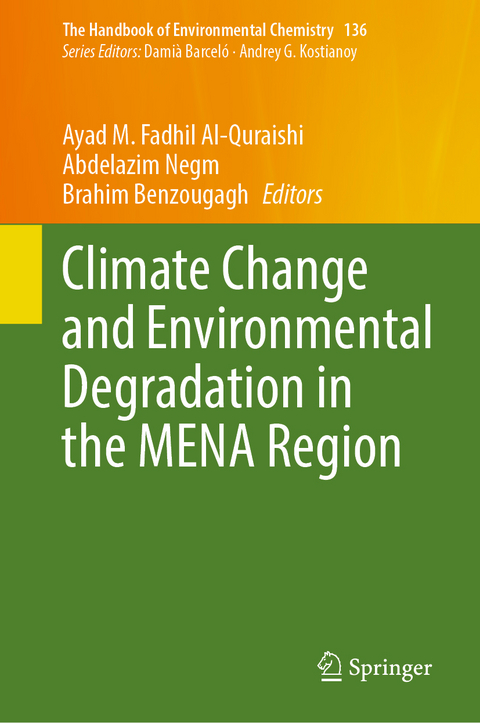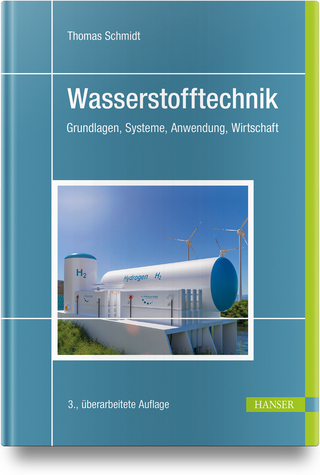
Climate Change and Environmental Degradation in the MENA Region
Springer International Publishing (Verlag)
978-3-031-74394-8 (ISBN)
- Noch nicht erschienen - erscheint am 14.01.2025
- Versandkostenfrei
- Auch auf Rechnung
- Artikel merken
This book reviews the factors contributing to the degradation of natural resources in the MENA region caused by climate change and contamination. It examines how these issues affect humans, their health, resources, and the planet's future. The impact of climate change is evident in the diminishing quality of land, water, and air, which leads to several environmental problems such as drought, land degradation, vegetation decline, reduced water bodies, soil damage, and other ecological concerns. Divided into 21 chapters, the book comprehensively analyses the risks brought about by climate change and environmental pollution. The chapters are contributed by a diverse team of authors from various countries in the MENA region, who offer a comprehensive overview of recent technologies, future developments, and several case studies analyses. In this book, readers will find topics such as:
- Impact of climate change, saline irrigation water, and other factors on soil degradation and carbon and nitrogen cycling in the MENA region
- Desertification, flood-storms, contamination, and their effects on natural resources and sustainability in the region
- Impact of recycled scrap steel on soil contamination, agriculture wastewater on lakes degradation and water pollution, and the effects of wastewater on agriculture
- Consequences of mismanaging natural resources and their influence on the environment
- interrelation between Greenhouse Gas Emissions, Climate Change, and the deterioration of natural resources
- Application of non-conventional methods to address natural resource issues.
This book calls for action to protect natural resources and the environment. These measures may include enacting legislation and regulations to restrict human activities, developing public understanding of the necessity of environmental protection against climate change and environmental contamination, and supporting sustainable behaviours to preserve natural resources. Given its breadth, the book appeals to scholars, researchers, and policymakers alike.
Ayad M. Fadhil Al-Quraishi is a Professor of Applied Remote Sensing & GIS at Tishk International University (TIU) in Erbil, Kurdistan Region, Iraq. He earned his Ph.D. Eng. in Geodetection and IT from the China University of Geosciences (CUG), Wuhan, China, and has accumulated extensive teaching experience at both Iraqi and international universities. Over the course of his career, he has supervised and examined 60+ postgraduate students (Ph.D. & M.Sc.) and has authored 80+ papers published in national and international journals and conferences. Dr. Al-Quraishi has also edited four books for Springer and contributed to 23 book chapters. His published paper on drought in the Kurdistan region of Iraq was recognized as one of the top papers for World Day to Combat Desertification and Drought in 2012. Additionally, he has participated in numerous international scientific projects and has been an active member of the scientific community, serving as a scientific committee member, keynote speaker, reviewer, and participant in 50+ international conferences, workshops, and symposiums. He holds memberships in several international scientific and professional organizations. Furthermore, Dr. Al-Quraishi has served as a Guest Editor for the journals "Remote Sensing" and "Water," published by MDPI, and the Journal of Applied Remote Sensing, published by SPIE. He has also reviewed 400+ papers for WoS and Scopus-indexed journals and is a member of the editorial boards of several international scientific journals. Beyond his academic accomplishments, Dr. Al-Quraishi was selected as a Fulbright Visiting Scholar at Michigan State University (MSU), USA, in 2011 and as a Visiting Professor at the University of Alabama (UA), USA, in 2022. Since 2016, he has been the Ambassador for Iraq of the IEEE Geoscience and Remote Sensing Society (IEEE-GRSS).
Abdelzim M. Negm is a Professor of Hydraulics (and Water Resources) at the Faculty of Engineering, Zagazig University (ZU), Egypt, since 2004. He was the Vice Dean of the Faculty of Engineering of ZU from Dec-2008 to Dec-2011 and was the Head of the Environmental Engineering Department at Egypt-Japan University of Science and Technology (E-JUST), Egypt, from Oct-2013 to Mar-2016. With 400+ papers in national and international journals and conferences, Prof. Negm has also contributed to 50+ book chapters and edited 50+ books, including some volumes in The Handbook of Environmental Chemistry book series from Springer. He was the editor-in-chief of EIJEST during the period from 2017 to 2020, an editor of the EMJEI, which was published by Springer, and an associate editor of the Journal of Remote Sensing and Space Sciences and Scientific African Journal, which was published by Elsevier. He is also the Head of the Permanent Scientific Committee on Water Resources (committee no.115), the supreme council of Egyptian Universities, Egypt. Prof. Negm is listed in the most famous and prestigious directories in the world, including the American Biographical Institute (ABI), Inc, USA, "Marquis Who's Who in the World," 27th Ed., 2010, USA, to present, and in IBC's 2000 as an Outstanding Intellectual of the 21st Century by the International Biographical Center, Cambridge, England, since 2011 to present. He was nominated for various awards by both ABI and IBC during the period from 2011 to 2012.
Brahim Benzougagh is a Professor at the Department of Geomorphology and Geomatics, Scientific Institute of Mohammed V University of Rabat-City, Morocco. His research interests include remote sensing and geographic information systems (GIS) applications to natural hazard assessment and mitigation, including landslide susceptibility modeling, slope stability analysis, flood mapping, soil erosion monitoring,
Section 1: Soil Degradation.- Changing carbon dynamics under climate change and land degradation in MENA region: Prospective of innovative management practices.- Exploring the interconnection between greenhouse gas emissions, climate change and natural resource degradation in central region of Morocco.- Greenhouse Gases Emission in Degraded Soil: Focus on the Mediterranean Climate.- Cloud-Based Soil Loss Assessment in Northeastern Libya using the Revised Universal Soil Loss Equation (RUSLE) and Google Earth Engine Platform.- Assessing Climate Change Impacts on Rainfall-Runoff in Northern Iraq: A Case Study of Kirkuk Governorate, a Semi-Arid Region.- Impacts of Saline Water Irrigation on Land Degradation in the Kurdistan Region, Iraq.- Geoinformatics Approaches to Climate Change-Induced Soil Degradation in the MENA Region: A Review.- Section 2: Climate Change and Sustainability.- Desertification in Algeria and Turkey: Climate Change Leading to "Natural Selection" of Restoration Concepts.- Shedding The Light on Irrigation Systems Degradation in the Algerian Desert.- Climate Change, Drought, and Water Scarcity in the MENA Region.- Google Earth Engine (GEE) to Detect Vegetation Cover Changes in Northwest of Libya.- Impact of Green Generation, Green Morocco, and Climate Change Programs on Water Resources in Morocco.- Monitoring Greenhouse Gas Emissions in Northern Africa Using Spatio-Temporal Analysis with Google Earth Engine (2019-2022).- Impact of Climate Change on Iraq: Severe Water Scarcity and Desertification.- Section 3: Environmental Contamination.- Emerging Contaminants in Soil and Water: Challenges and Management.- Climate Change, Dust Storms, and Air Pollution in MENA.- Effect of Wastewater on Lakes Degradation in Egypt: Challenge and Management.- Environmental Issues and Concerns in Iraq and Kurdistan Region Due to Various Pollutants.- Leveraging Geoinformatics to Analyse Environmental Contamination Amidst Climate Change in the MENA Region: A Review.- Reducing Oil Pollution in Kawergosk (Erbil-Iraq) Oil Refinery Effluent.- Climate Change and Human Health in the MENA Region: A Geoinformatics Perspective.
| Erscheinungsdatum | 25.12.2024 |
|---|---|
| Reihe/Serie | The Handbook of Environmental Chemistry |
| Zusatzinfo | XIX, 469 p. 182 illus., 169 illus. in color. |
| Verlagsort | Cham |
| Sprache | englisch |
| Maße | 155 x 235 mm |
| Themenwelt | Naturwissenschaften ► Biologie ► Ökologie / Naturschutz |
| Naturwissenschaften ► Chemie ► Technische Chemie | |
| Schlagworte | Agriculture Wastewater • Air Pollution • climate change • Desertification • dust storms • Emerging Contaminants in Soil and Water • environmental contamination • Greenhouse Gas Emissions • Natural Resources Degradation • Soil Degradation • water resources • water scarcity |
| ISBN-10 | 3-031-74394-6 / 3031743946 |
| ISBN-13 | 978-3-031-74394-8 / 9783031743948 |
| Zustand | Neuware |
| Informationen gemäß Produktsicherheitsverordnung (GPSR) | |
| Haben Sie eine Frage zum Produkt? |
aus dem Bereich


